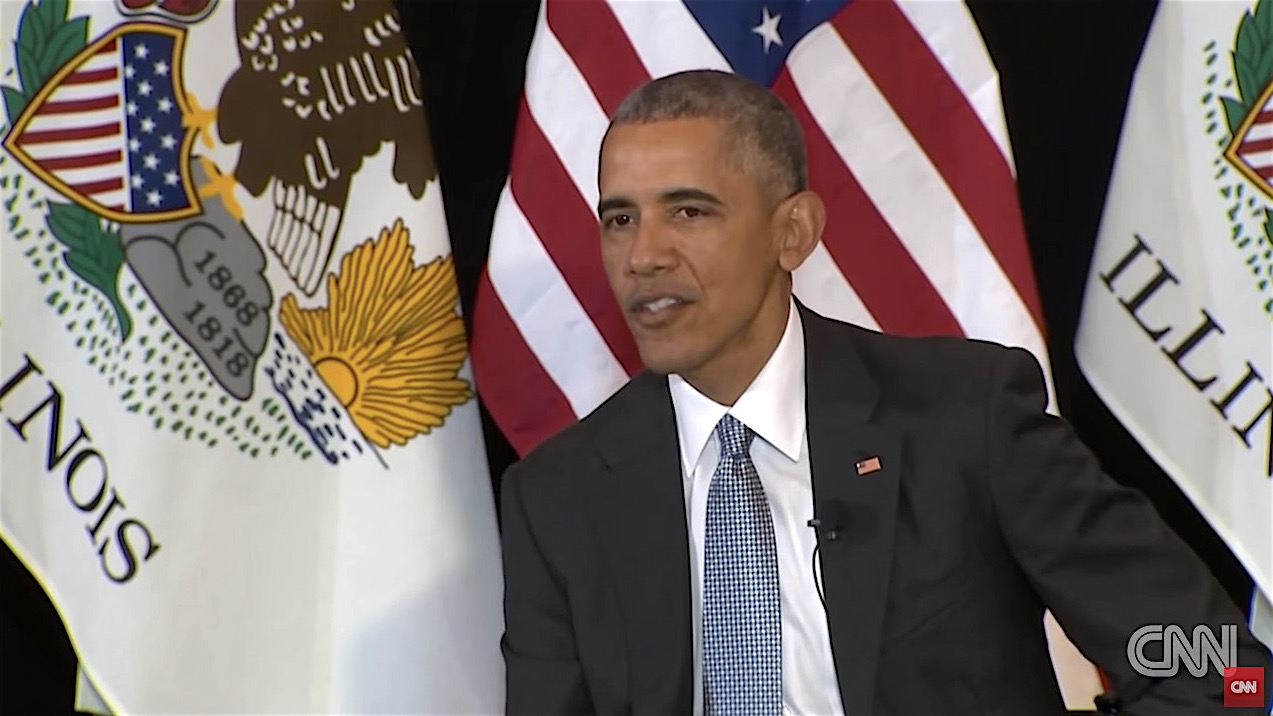Obama warns GOP on blocking Supreme Court nominee, jokes about picking 'white guy' Garland


A free daily email with the biggest news stories of the day – and the best features from TheWeek.com
You are now subscribed
Your newsletter sign-up was successful
President Obama returned to the University of Chicago Law School on Thursday to promote his nominee to the U.S. Supreme Court, Merrick Garland, in the face of Republican Senate refusal to even consider the candidate. "If you start getting into a situation in which the process of appointing judges is so broken, so partisan that an eminently qualified jurist cannot even get a hearing, then we are going to see the kinds of sharp partisan polarization that have come to characterize our electoral politics seeping entirely into the judicial system," Obama said in his speech. "Our democracy can't afford that."
In questions from students after the speech, Obama addressed a question about diversity, saying that "at no point did I say: 'Oh, you know what? I need a black lesbian from Skokie in that slot. Can you find me one?'... I mean, that's just not how I've approached it." Obama said that he has "transformed the federal courts from a diversity standpoint with a record that's been unmatched." But his method of promoting diversity is to broaden the pool of applicants, not fill quotas. Garland, he said? "Yeah, he's a white guy, but he's a really outstanding jurist. I'm sorry. I mean, you know, I think that's important."
Republicans on Thursday showed no significant sign of changing tack on the Garland nominee, or any Obama pick, with Senate Majority Leader Mitch McConnell saying on the Senate floor that it was unacceptable to have a "far-left Supreme Court." Meanwhile, conservative groups were throwing around their own pick for Supreme Court nominee, Sen. Mike Lee (R-Utah), which probably requires Ted Cruz winning in November.
The Week
Escape your echo chamber. Get the facts behind the news, plus analysis from multiple perspectives.

Sign up for The Week's Free Newsletters
From our morning news briefing to a weekly Good News Newsletter, get the best of The Week delivered directly to your inbox.
From our morning news briefing to a weekly Good News Newsletter, get the best of The Week delivered directly to your inbox.
A free daily email with the biggest news stories of the day – and the best features from TheWeek.com
Peter has worked as a news and culture writer and editor at The Week since the site's launch in 2008. He covers politics, world affairs, religion and cultural currents. His journalism career began as a copy editor at a financial newswire and has included editorial positions at The New York Times Magazine, Facts on File, and Oregon State University.
-
 Will increasing tensions with Iran boil over into war?
Will increasing tensions with Iran boil over into war?Today’s Big Question President Donald Trump has recently been threatening the country
-
 Corruption: The spy sheikh and the president
Corruption: The spy sheikh and the presidentFeature Trump is at the center of another scandal
-
 Putin’s shadow war
Putin’s shadow warFeature The Kremlin is waging a campaign of sabotage and subversion against Ukraine’s allies in the West
-
 ABC News to pay $15M in Trump defamation suit
ABC News to pay $15M in Trump defamation suitSpeed Read The lawsuit stemmed from George Stephanopoulos' on-air assertion that Trump was found liable for raping writer E. Jean Carroll
-
 Judge blocks Louisiana 10 Commandments law
Judge blocks Louisiana 10 Commandments lawSpeed Read U.S. District Judge John deGravelles ruled that a law ordering schools to display the Ten Commandments in classrooms was unconstitutional
-
 ATF finalizes rule to close 'gun show loophole'
ATF finalizes rule to close 'gun show loophole'Speed Read Biden moves to expand background checks for gun buyers
-
 Hong Kong passes tough new security law
Hong Kong passes tough new security lawSpeed Read It will allow the government to further suppress all forms of dissent
-
 France enshrines abortion rights in constitution
France enshrines abortion rights in constitutionspeed read It became the first country to make abortion a constitutional right
-
 Texas executes man despite contested evidence
Texas executes man despite contested evidenceSpeed Read Texas rejected calls for a rehearing of Ivan Cantu's case amid recanted testimony and allegations of suppressed exculpatory evidence
-
 Supreme Court wary of state social media regulations
Supreme Court wary of state social media regulationsSpeed Read A majority of justices appeared skeptical that Texas and Florida were lawfully protecting the free speech rights of users
-
 Greece legalizes same-sex marriage
Greece legalizes same-sex marriageSpeed Read Greece becomes the first Orthodox Christian country to enshrine marriage equality in law
